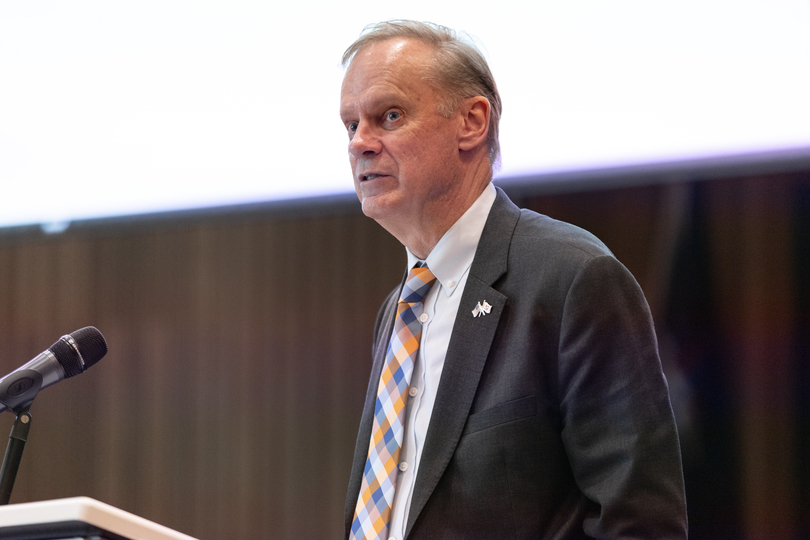SU chancellor says nationwide demonstrations after Oct. 7 ‘encouraged from Iran’

Syracuse University Chancellor Kent Syverud said nationwide demonstrations following the Oct. 7 attack were "encouraged from Iran." Syverud spoke at an Oct. 28 panel hosted by Alums for Campus Fairness. Joe Zhao | Senior Staff Photographer
Get the latest Syracuse news delivered right to your inbox.
Subscribe to our newsletter here.
UPDATE: This post was updated at 2:25 p.m. on Nov. 3, 2025.
Syracuse University Chancellor Kent Syverud suggested Iran may have influenced the wave of pro-Palestine protests across college campuses in 2024 during an Oct. 28 panel in Washington, D.C.
The chancellor’s remarks centered broadly on how SU administrators handled demonstrations after Hamas’ Oct. 7 attack and the ongoing war in Gaza. He discussed the 16-day Gaza Solidarity Encampment on SU’s campus and his belief that many of the GSE demonstrators weren’t SU students.
“When things happened — that I really believe were encouraged from Iran — it did not have the involvement of very many, if any, of our own students,” Syverud said.
Syverud, who’s slated to leave SU at the end of this school year, joined two other university chancellors for the discussion Tuesday. Hosted by Alums for Campus Fairness, the panel focused on how they’ve worked to combat antisemitism since the start of the Israel-Hamas War.
He also briefly spoke about a recent hate crime committed against SU’s chapter of Zeta Beta Tau, a historically Jewish fraternity.
In a Sunday statement to The Daily Orange, Sarah Scalese, SU’s Vice President for Communications, wrote that Syverud’s remarks addressed national trends in on-campus demonstrations and challenges universities face in “balancing free expression with community safety.”
Scalese’s statement didn’t address Syverud’s comments on Iran.
“When he noted that ‘very few’ Syracuse University students were involved, he was referring to the proportion of participants in the encampment relative to the overall student population,” Scalese wrote. “It is true that the encampment on our campus did include individuals from outside the university, including community members, activists and other non-students.”
The idea of Iran’s involvement in encouraging protests against Israel’s war against Hamas first emerged in a July 2024 press release from Avril Haines, the former director of national intelligence under President Joe Biden’s administration. Haines said Iranian groups were posing as activists on social media and encouraging Americans to protest.
The other panelists echoed Syverud’s point, describing the spread of encampments as a “social contagion” and speculating there were “organized networks promoting protests.” However, Syverud was the only one to directly mention Iran.
The panel aimed to contextualize how universities can address rising rates of antisemitism and spoke about the nationwide encampments. The host, Alums for Campus Fairness President Avi Gordon, and panelists were broadly critical of the protests that followed the Oct. 7 attack, saying they fueled antisemitic attitudes.
Other administrators in attendance included Chancellor Andrew Martin of Washington University in St. Louis and Chancellor Daniel Diermeier of Vanderbilt University. Ben Jacobs, a journalist at Politico, moderated the conversation.
“Last year, higher education became front page news, as schools were taken over by on-campus insurgence,” Gordon said. “Radical students and faculty members set up unlawful encampments, praised the acts of a terrorist organization and intimidated their own classmates. Too many universities accommodate this hate through inaction.”
SU’s encampment ran from April 29 to May 15, 2024, on the Shaw Quadrangle, in the weeks leading up to that year’s commencement. At its peak, around 70 tents sat on the Quad’s lawn. The encampment voluntarily disbanded shortly after administrators responded to demonstrators’ demands, citing existing university policies.

Meghan Hendricks | Daily Orange File Photo
During the panel, Syverud discussed how he approached the GSE and the protests that followed Oct. 7, saying the university had to “deal with new things every step of the way.” In particular, he said the administration had to balance students’ rights to free speech with their sense of safety and security.
On May 7, 2024, SU released its “Syracuse Statement on Free Expression and Free Inquiry,” which a group of university community leaders had been working on throughout that spring semester. Among other provisions, the statement affirmed the university’s commitment to “institutional neutrality” and pledged that it would no longer issue institution-wide statements on “current controversies.”
Syverud said while the encampment movement “took a while” to reach SU, issues regarding the speech of student protestors emerged quickly in the wake of the attack. He said the university restricted speech that created a “hostile environment” for Jewish students, per Title VI of the Civil Rights Act of 1964.
On Dec. 15, 2023, administrators confronted demonstrators conducting a pro-Palestine “study-in” in the Schine Student Center and asked them to take down a poster that read “globalize the intifada.” Syverud said during the panel that, in this case, SU determined that the phrase fulfilled the standard for creating a hostile environment, though it did permit some phrases, including “from the river to the sea.”
“What we did have in the early days in Syracuse, and early weeks, was an evolving set of rules of what Title VI meant. What created a hostile environment?” Syverud said. “I was not prepared to decide whether I needed to launch into doing something when people chanted, ‘From the river, to the sea.’”
Some of the statements made during the encampment were “troubling,” Syverud said, as he believes many could be interpreted as personally directed at Jewish or Israeli students. He added administrators initially struggled to determine which speech fell under university protections and who was responsible for enforcing those rules.
Syverud said some encampment protestors wore masks to “avoid accountability,” adding many were local activists not affiliated with the university.
After the encampment, seven SU students faced disciplinary action for alleged conduct code violations.
Later in the panel, Syverud spoke briefly about the hate crime against ZBT, where one SU student entered their home during Rosh Hashanah and threw a bag of pork at its walls and another served as a getaway driver. The two suspects, 18-year-olds Kyle Anderson and Samuel Patten, are now facing burglary as a hate crime and criminal nuisance charges.
Syverud said that, though he won’t comment on the incident because the investigation is still ongoing, he believes it reflects the pervasiveness of antisemitism on college campuses. He also said many administrators appear to be “in denial” that the issue still exists today.
“I don’t want to presume the facts, but what I want to tell you (is) I’m proud we were on it quickly and took it seriously,” Syverud said. “What it reflects though, it may well reflect just an appalling degree of ignorance of today’s college students of the history of Israel, the history of antisemitism.”
The panel came two months after Syverud announced he was to leave the chancellor role at the end of the 2025-26 academic year. In mid-October, SU’s Chancellor Search Committee announced it had finalized its criteria for the selection of the next chancellor.






